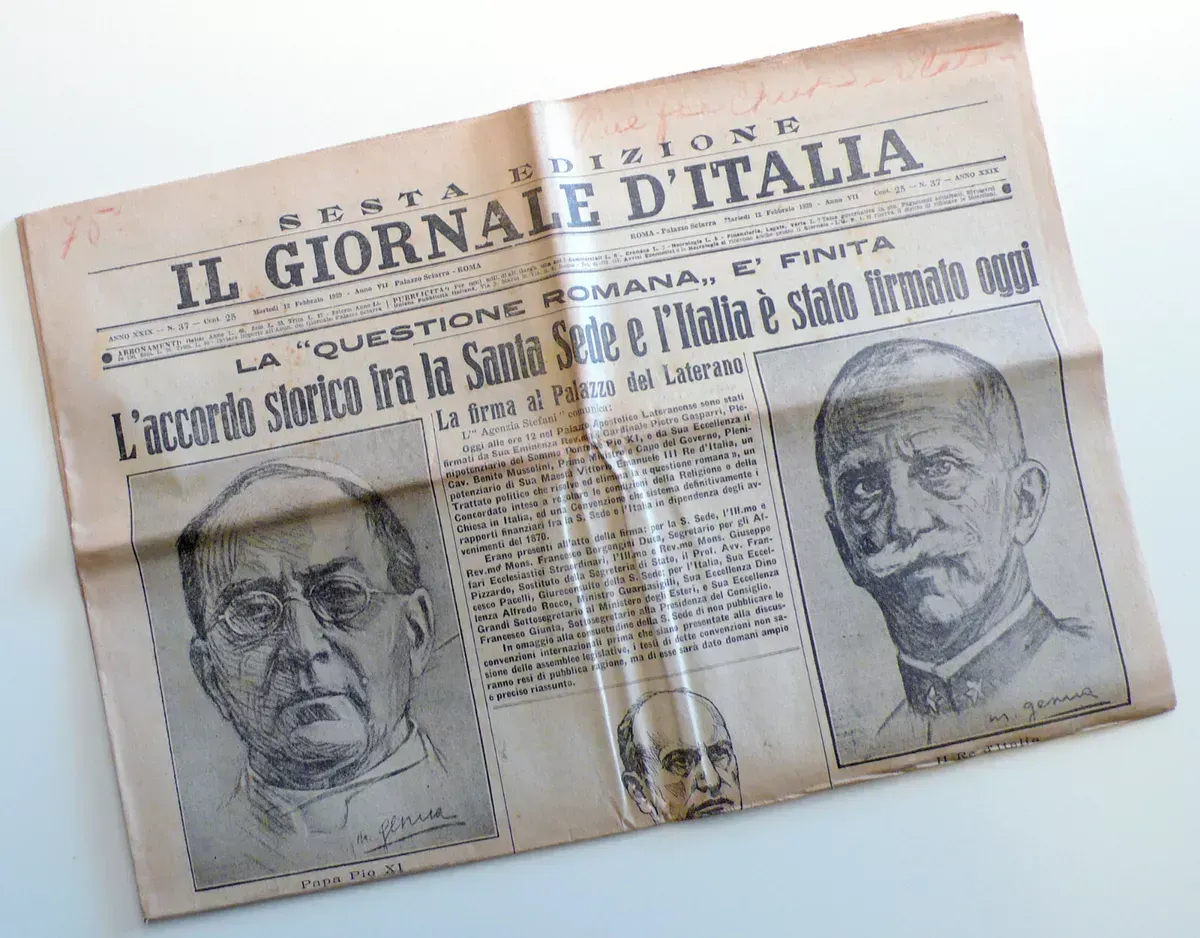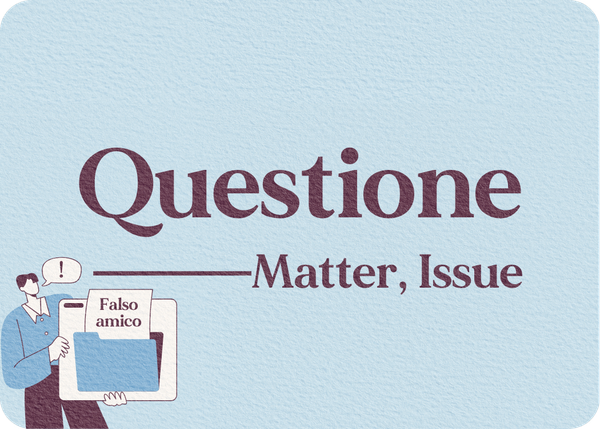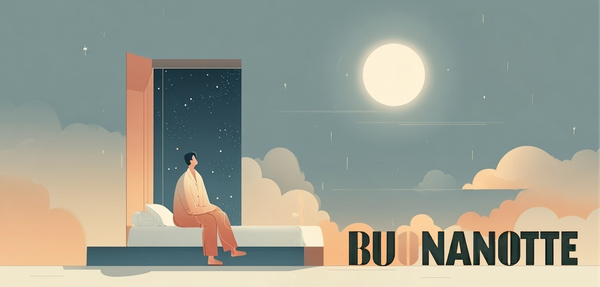Questione
NOUN [feminine]
Meaning and English translation 🔖
1. Problem, Matter
🇬🇧 A situation that constitutes a problem to be evaluated and possibly solved.
🇮🇹 Situazione che costituisce un problema da valutare ed eventualmente risolvere.
2. Issue, Dispute
🇬🇧 A problematic condition that has been long debated with various proposed solutions due to its relevance and complexity.
🇮🇹 Condizione problematica, che per la sua rilevanza e complessità è stata a lungo dibattuta con varie proposte di soluzione.
| Masculine ♂️ | Feminine ♀️ | |
|---|---|---|
| Singular | - | la - una questione |
| Plural | - | le - delle questioni |
Example sentences 💬
La questione ambientale è diventata sempre più urgente negli ultimi anni.
The environmental issue has become increasingly urgent in recent years.
Ci sono molte questioni etiche da considerare quando si parla di bioingegneria.
There are many ethical issues to consider when discussing bioengineering.
This article is brought to you by Giulia School, where you can learn Italian the natural way—with real conversations and passionate teachers guiding you every step of the journey. It’s the closest thing to immersion you can get without living in Italy. Click here to learn more.
Idioms with questione 🇮🇹
Essere questione di
→ To be a matter of
È solo questione di tempo prima che la situazione migliori.
It's only a matter of time before the situation improves.
Fuori questione
→ Out of the question
Andare in vacanza questo mese è fuori questione.
Going on vacation this month is out of the question.
Nocciolo della questione
→ Heart of the matter
Dopo due ore di riunione, finalmente siamo arrivati al nocciolo della questione.
After two hours of meeting, we finally got to the heart of the matter.
Questione di lana caprina
→ A trivial matter
Nòcciolo o Nocciòlo non è una questione di lana caprina: sono due cose diverse!
'Nòcciolo' or 'Nocciòlo' is not a trivial matter: they are two different things!
Mettere in questione
→ To call into question
Non intendo mettere in questione la tua integrità.
I don't mean to call your integrity into question.
Questione di vita o di morte
→ Matter of life or death
Per alcune specie in via d'estinzione, la conservazione dell'habitat è una questione di vita o di morte.
For some endangered species, habitat conservation is a matter of life or death.
In questione
→ In question
Il documento in questione non è stato ancora trovato.
The document in question has not been found yet.
Farne una questione di principio
→ To make it a matter of principle
Ha rifiutato di scusarsi e ne ha fatto una questione di principio.
He refused to apologize and made it a matter of principle.
Where does the word questione come from? 🔎
Questione comes from the Latin quaestionem, accusative of quaestio, which derives from the verb quaerere meaning "to seek, to ask".
Did you know that... 🤓
Impress your italian friends with curious facts about Italy and its culture
The Roman Question: the struggle that questioned the Pope's power.
It was only a matter of time: I finished my vacation and returned to Rome.
Yesterday, Sunday, despite the heat, I decided to take a walk downtown and passed by Porta Pia.
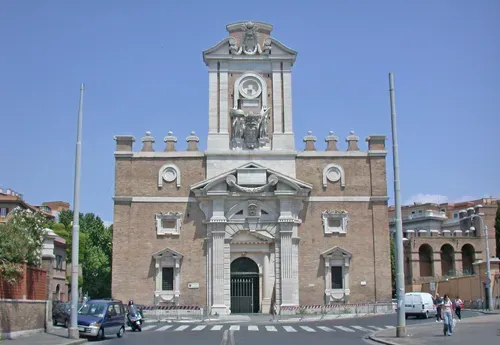
There, I wondered: "How many tourists pass by here every year without knowing its history?" When you come to Rome next time, you can impress your friends by explaining the history of this part of Rome and the famous Roman Question.
In 1870, Italy had been united for only nine years. The capital of the Kingdom was Florence, and Rome was still part of the Papal State.
The new Kingdom of Italy wanted Rome as its capital, but the Pope was firmly opposed—it was not just a matter of principle but of power.
On September 20th, the Italian army entered the Papal States by making a breach in the Aurelian Walls near Porta Pia. This event is called "the breach of Porta Pia" (breach = hole, opening).
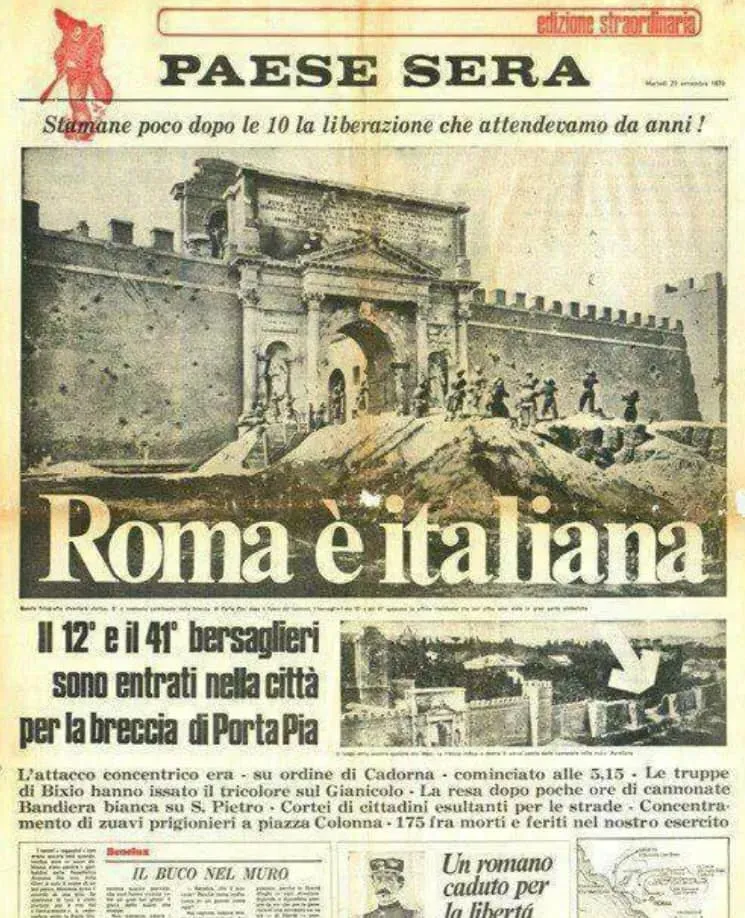
Pope Pius IX refused to recognize the Italian State and began calling himself "prisoner in the Vatican," not leaving the Vatican for the rest of his life. Subsequent popes continued this protest, which lasted almost 60 years!
In 1871, the Italian government passed the "Legge delle Guarentigie." This law aimed to give the Pope many privileges and money: 3,225,000 lire per year (about €18 million). But the Pope refused everything. He did not want to accept a law made only by the Italian State, which he did not recognize.
This situation - called the Roman Question - created many problems. Italy was a very Catholic country, and some Italians sided with the Pope, while others wanted Rome to be entirely Italian and become the capital of the Kingdom.
In 1874, the issue worsened even more when the Pope explicitly forbade Catholics from participating in the Italian nation's public life with the formula non expedit (in Latin, "it is not convenient").
On the other hand, the Italian State did not stand by idly. It passed laws to separate the State from the Church and, in a gesture of defiance, built monuments dedicated to people the Church did not favor - like Arnaldo da Brescia and Giordano Bruno, and renamed some streets to celebrate the victory over the Papal State - Via XX Settembre is named so because it celebrates the Breach of Porta Pia!
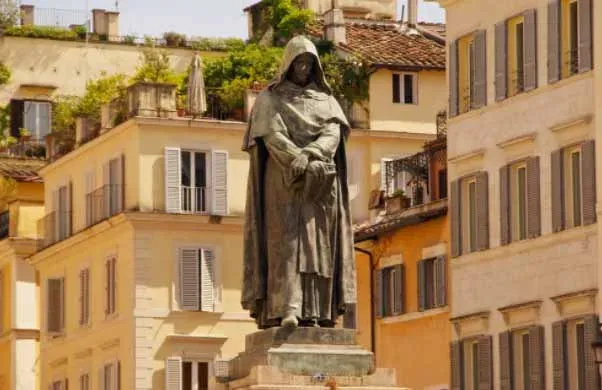
Finally, the issue was resolved in 1929 when Benito Mussolini and Pope Pius XI signed the Lateran Pacts. These agreements still recognize today the sovereignty of the Holy See over the new state of Vatican City and govern the relations between Italy and the Catholic Church.
